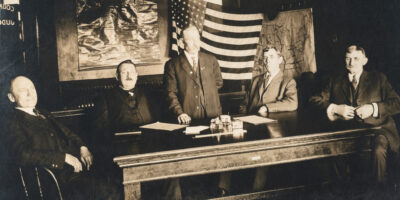The State Is a Greasy-Hand Tourist

No matter your race, color, creed, gender, sexual orientation, or favorite football team, there has never been a better time to be alive, broadly speaking, than right now — and it’s getting better all the time. Sadly, a lot of people don’t know it, know it and don’t care, or know it and hate it.
I used to have a chunk of the Berlin Wall that I would show to students during a brief discussion of why ideas, and the ideas at the foundation of Western civilization, matter. I’ve misplaced that piece of the Wall.
In Suicide of the West, Jonah Goldberg explains how intellectuals especially have misplaced their understanding of and enthusiasm for the West’s halting and imperfect but nonetheless revolutionary experiment in liberty. Fewer than two generations have passed since Nazism was defeated, and yet tribalism, nationalism, and populism are making a comeback. It hasn’t been a generation — not even 30 years, as of this writing — since the Berlin Wall came down, and elite media outlets are telling us “It’s Time to Give Socialism a Try” (Washington Post) and “Free Speech Is Killing Us” (New York Times).
Just as I hope I rediscover my piece of the Wall, I hope thought leaders, politicians, executives, and others who are so enamored of the politics of control — whether in their left-wing versions as embodied in Bernie Sanders and Alexandria Ocasio-Cortez or in their right-wing versions as embodied in Donald Trump — rediscover the ideas that made liberty and prosperity possible.
Suicide of the West is an entry in a long and venerable tradition of jeremiads lamenting the crumbling foundations of Western civilization and predicting doom if something doesn’t change. It is comfort food for people (like me) who think the Western tradition, for all its warts and imperfections, has much to recommend it. Goldberg invites readers to consider very carefully where we have been, what has gotten us where we are, and where we might go if we don’t guard the political and cultural institutions that have allowed so many of us to flourish in ways our ancestors couldn’t have imagined.
Goldberg begins with “some assertions” on page 6. What seems obvious to us today is actually a radical break from the way things have always been. Here is Goldberg:
Capitalism is unnatural. Democracy is unnatural. Human rights are unnatural. The world we live in today is unnatural, and we stumbled into it more or less by accident. The natural state of mankind is grinding poverty punctuated by horrific violence terminating with an early death. It was like this for a very, very long time.
How long? He asks the reader to “imagine you’re an alien assigned with keeping tabs on Homo sapiens over the last 250,000 years. Every 10,000 years you check in.” Pretty much every entry is “Semi-hairless, upright, nomadic apes foraging and fighting for food. No change.” On your visit about 10,000 years ago, you would notice that things had changed a bit with the development of settled agriculture. Alien observers arriving in 2019 would find a world that is utterly unlike anything they observed on their previous visits — and essentially all of the progress has been limited to the last three centuries. It isn’t too much of an exaggeration to say that I enjoyed a bigger increase in my standard of living with the last software update for my phone than my medieval ancestors enjoyed in a lifetime.
Goldberg spends the rest of the book evaluating what the sociologist Robin Fox and the historian Ernest Gellner call “the Miracle.” He draws a lot of inspiration from Deirdre McCloskey’s magisterial project on what she calls the Bourgeois Era (which he documents in an appendix). Her thesis, in short, is that what she calls the Great Enrichment happened because new ideas about liberty and dignity for common people and innovators emerged in northwestern Europe (of all places) and then spread slowly and imperfectly around the world. No doubt it pales in comparison to the very best world we can imagine, but it is unambiguously better than the world our ancestors inhabited.
How? Goldberg explains all the ways that will be familiar to people who have read McCloskey, Steven Pinker, and Hans Rosling (I summarize some of these facts here). Violence is lower. Life expectancy has risen. Child mortality has plummeted. Compared with our ancient hunter-gatherer ancestors, we are far less likely to have our heads crushed in late adolescence or early adulthood by a rock-wielding member of a rival tribe. In the course of about a century, one of the most ancient and vile of human institutions — slavery — was abolished. We live longer, healthier, richer lives — and we take it for granted.
Goldberg asks his readers to consider two versions of the classic tale of the goose that laid the golden eggs. Adam Smith’s golden-egg-laying goose — “the liberal plan of equality, liberty, and justice” — arrived on the scene in the middle of the 18th century, give or take a few decades. In one version of the story, a man asks the goose to lay even more golden eggs and then simply kills the goose in a fit of rage when it turns out it can’t. In the second version, the people who come to own the golden goose reason that there must be gold inside the goose if it is laying golden eggs — so they kill the goose to get at the gold. Neither story ends happily as people indulge their impatience and ingratitude.
Western civilization, Goldberg argues, is like the goose that laid the golden eggs. The “burn it all down” ethos of destructionism puts us in danger of killing the goose in our impatient rage at the unacceptable pace with which it lays golden eggs. It is no less folly to think we can immanentize the eschaton by killing the goose to get at the gold for which we are so impatient. It is a grave mistake to think so confidently that the liberty, equality, and prosperity we take for granted happen automatically.
In other words, as Goldberg points out on page 66, “Poverty is natural; wealth takes effort.” The same, he argues, is true of inequality, war, slavery, and oppression. It has to be sustained by continued and deliberate effort, and this is no easy task. As Hannah Arendt has pointed out, “every generation, civilization is invaded by barbarians — we call them ‘children’” (cf. p. 274). The work isn’t done even once they are at least nominally civilized: as Goldberg discusses in his second chapter, even the most civilized and refined group devolves into the horror of William Golding’s Lord of the Flies (pp. 47 ff.) — and even the most nominally civilized are capable of “the horror, the horror” of Joseph Conrad’s Heart of Darkness.
He offers an interesting take on “corruption,” one that will stick with the reader. Goldberg asks us to imagine a brand-new car left in a field unattended (p. 349). Without investment, upkeep, and hard work, nature reclaims it. Any homeowner knows this: Air conditioners break. Roofs and pipes leak. Decay and corruption are forces of nature that have to be fought deliberately. Goldberg argues that decay and corruption are natural forces in the social realm. Over time, an untended garden, house, or car gets overtaken by nature. So too does an untended relationship. Or culture. Or civilization.
At this point, my inner angsty teenager, social reformer, and humanitarian are joining their voices in protest. They feel that this is a limited, stunted, and unhappy conclusion, and they push back against so-called constraints in the felt conviction that “there must be a better way!” (p. 14). Goldberg calls it “romanticism,” by which he means (pp. 13–14, emphasis in original)
the primacy of feelings. Specifically, the feeling that the world we live in is not right, that it is unsatisfying and devoid of authenticity and meaning (or simply requires too much of us and there must be an easier way). Secondarily, because our feelings tell us that the world is out of balance, rigged, artificial, unfair, or — most often — oppressive and exploitative, our natural wiring drives us to the belief that someone must be responsible.
According to Goldberg, however, there really is no easily achievable and obvious “better way.” Romanticism, he argues, is the road to corruption: “The greatest force in the corruption of modernity is the organized political effort — active in every generation — to impose the rules of gemeinschaft on the gesellschaft,” (p. 64), where “gemeinschaft” is “the personal order of family, friends, and community” while “gesellschaft” is “the external, impersonal, order of contracts, commerce, and law” (p. 62). As he notes, following Friedrich Hayek, the rules that make gemeinschaft work are incompatible with gesellschaft, and the rules that make gesellschaft work are incompatible with gemeinschaft. Charging a stranger a fee to rent a room in your house on Airbnb works reasonably well. Charging your child a fee to rent a room in your house does not.
A lot of people, though, imagine a world in which we relate to and care about one another the same way we relate to and care about our children and our close personal friends. I particularly enjoyed a profoundly Smithian point raised by former senator (and father of my former department chair from my time at Rhodes College) Phil Gramm, who said that his policy on children was that no one could love his children like he and his wife.
An audience member objected, saying, “No, that’s not true: I love your children as much as you do.” Gramm’s reply: “Oh really? What are their names?” (p. 302). It’s a sublime point: we can love strangers, but not intimately — or not at any rate the way we love our friends and family.
It reminds me of a tragic scene in Eugene Richter’s Pictures of the Socialistic Future in which a mother’s knowledge about her daughter is ignored by those in charge of state child care. It ends tragically. The scene Goldberg recounts here is a brief and powerful illustration of the arrogance and presumption that comes with thinking we can simply choose to reject gesellschaft and embrace gemeinschaft as the only proper governing principle for a world of seven and a half billion people.
I paraphrase Deirdre McCloskey: the romantic anti-liberal vision turns an impossible and wholly imaginary Best into a very possible and very actual Pretty Good, or at Least Much Better Than Things Have Typically Been. Incremental improvement? Yes. Radical reimagining of humanity and society? We tried that in the 20th century, and it was, to borrow a phrase from Ayn Rand, akin to “tearing the lid off hell.” Goldberg explores the tension between free societies and grand social projects. The former most definitely are not the latter. Economic and political liberty per se do not provide people with a sense of meaning. This is apt to be very depressing to the legislator or reformer Adam Smith calls “the man of system,” who “is apt to be very wise in his own conceit” and “often so enamoured with the supposed beauty of his own ideal plan of government, that he cannot suffer the smallest deviation from any part of it.”
To the man of system then and now, the evolved, mediating institutions of civil society (the family, for example) simply aren’t legible. He can’t see in them an articulated and transcendent purpose, but he concludes that when he sees anything in them that is unlovely, it is because someone out of avarice or malevolence designed it that way. This is where the man of system is most dangerous. It is so very, very tempting to think that if only we were in charge, or people like us, or people we choose, everything would be great — and we can’t be faulted for trying hard and meaning well. This isn’t so. As economists and other social scientists have tirelessly pointed out for centuries, you don’t need bad intentions to create bad consequences. Goldberg likens the state and civil society to a tourist exploring a coral reef (p. 301):
If you’ve ever been scuba diving or snorkeling, you probably know that swimmers aren’t supposed to touch the coral with their bare hands. We have oils in our skin that disrupt the membranes of coral and can even kill a whole colony. The state is a greasy-handed tourist in civil society.
The American Founders, perhaps, were then quite wise to see themselves as “gardeners, not engineers” (p. 153). And perhaps social scientists would be most useful to society if we (re)discovered an ethic of “look, don’t touch” — or as Steven Landsburg pointed out in sharp contrast to Karl Marx, the economist’s goal should be to understand the world, not to change it.
In any case, at root is a conflict of visions: people like Goldberg (and Adam Smith, and F.A. Hayek, and Milton Friedman, and Thomas Sowell) believe that human nature is fixed. Others — much of the modern Left — believe it is social conditioning all the way down and can, therefore, be changed by changing the social institutions. It’s possible, in this view, to remake a society after an articulated and designed pattern. All that’s needed is “political will,” which loosely translated means “unchecked power for me and my friends.” Lest you think I’m exaggerating, Goldberg makes much of the intellectual rebellion against enlightenment liberalism during the Progressive Era. Hence we got the rise of the administrative state, what some believe to be a de facto fourth branch of government.
Stylistically, Suicide of the West is an easy and fun read. Goldberg can turn a phrase beautifully, the prose is clear, and it skips along in ways a lot of 400+ page doorstops simply don’t. Goldberg calls his readers to the defense of Western civilization against attackers from left and right. I can only hope we are up to the task.
Click here to hear Jonah Goldberg discuss the book with Russ Roberts on EconTalk.









